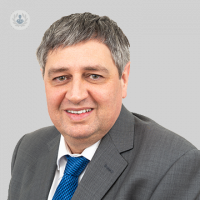Frequently asked questions about trigger finger
Written by:We speak to highly experienced consultant orthopaedic surgeon Mr Andrew Fitzgerald who answers your questions about trigger finger.
What are the most common causes of trigger finger?
Trigger finger takes place in the flexir tendon, which is the tendon which bends the finger in the hand. It can affect any of the fingers and also the thumb.
What happens is that the tendon gets caught at the base of the finger underneath the pulley. When the patient bends the finger, it gets caught and when they straighten it, because it’s being caught, they have to often use the other hand to flick it open.
The most common cause is an inflammation of the tendon and the covering around the tendon. There are many different reasons why that may happen.

This mainly occurs due to overuse but I often see patients suffering from the condition is because they have been doing more activities, commonly in the summer, such as getting out into the garden. They may have been cutting hedges or bushes and because they’re gripping something lot, it actually causes them to have some inflammation and pain.
Initially, they may not have the triggering but then as they continue to bend the hand and finger, the triggering develops because the tendon becomes more inflamed as it gets caught more.
How can repetitive motions or overuse lead to trigger finger?
The fact that you’re constantly bending the finger, (sometimes against force) where you’re gripping something can cause some local inflammation. This is what the trigger is for the problem to develop.
Are there any underlying medical conditions that can contribute to the development of trigger finger?
The other conditions that can contribute, we see more often in patients who are diabetic. It can also occur in patients with rheumatoid arthritis. It can occur in many other conditions and can affect people of all ages.
It tends to be slightly more common in women than in men and we often see it in patients in their 40s and 50s.
Can trigger finger be caused by arthritis or other forms of inflammation?
Trigger finger can be related to underlying inflammatory conditions and as previously mentioned, rheumatoid arthritis is one of those. It is also common in diabetics.
It can also occur in other conditions which are slightly less common, such as amyloidosis and gout. It can be associated with carpal tunnel syndrome as well.
Those are probably the most general contributing factors for potential development of a trigger finger.
How can trigger finger be prevented through changes in lifestyle or work habits?
You can help to prevent trigger finger by avoiding certain activities, such as those mentioned above. If you do get the problem, you resolve it and it settles down then reducing those activities can help. Sometimes people can take medications which can help to reduce trigger finger as well.
If you are suffering from trigger finger and would like to speak to Mr Fitzgerald, you can book a consultation through his Top Doctors profile today.


